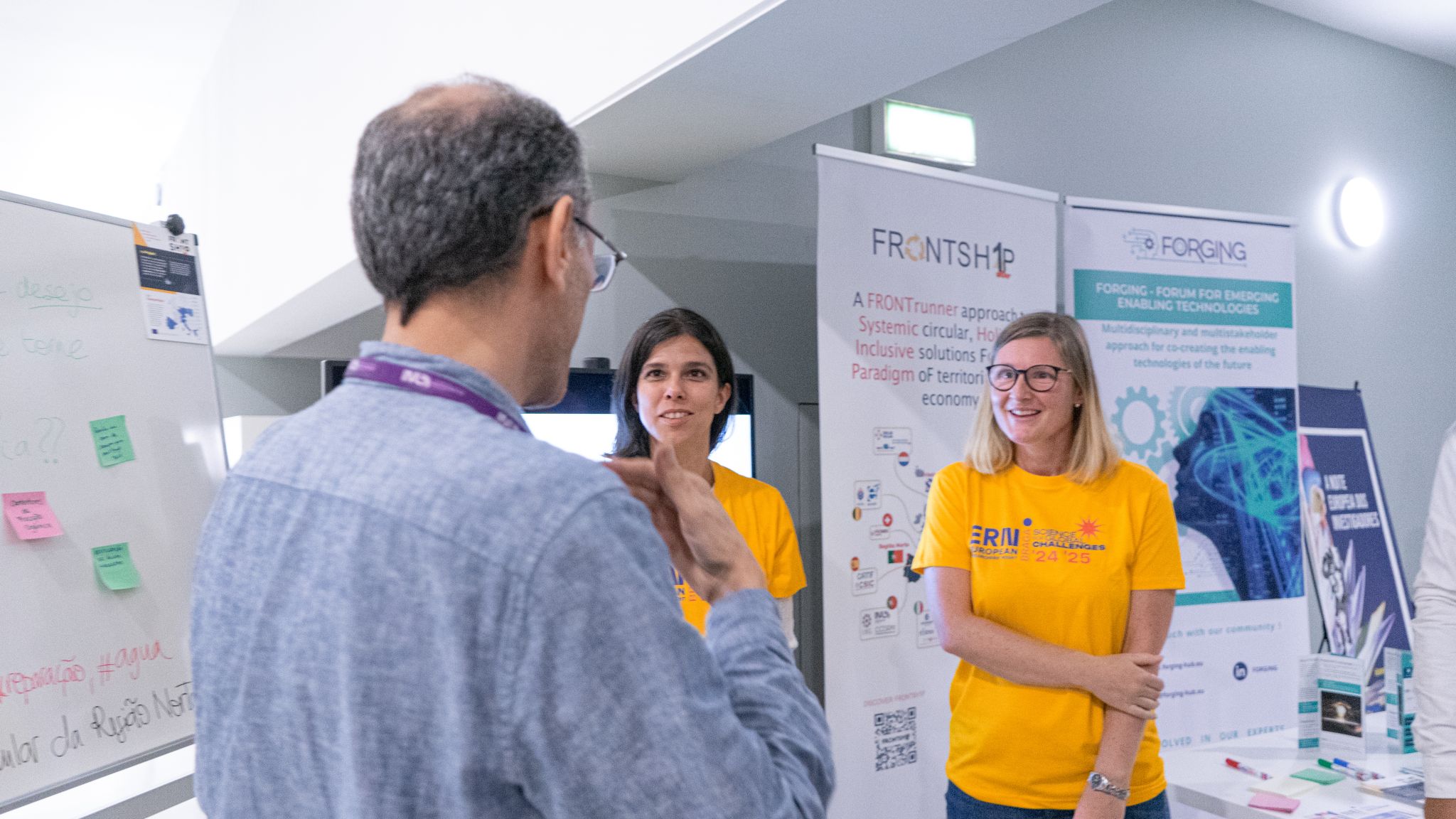Take a look to see our journey and key moments at several events, all which are highlighted on here.
Industry 5.0 Communities of Practice
Organised by the Directorate General for Research and Innovation at the European Commission, Industry 5.0 Community of Practice brought together on 16 October 2024 the expert group that worked over the past year on development of the concept and future framework for Industry 5.0, as well as the future orientations of the Communities of Practice for Industry 5.0.
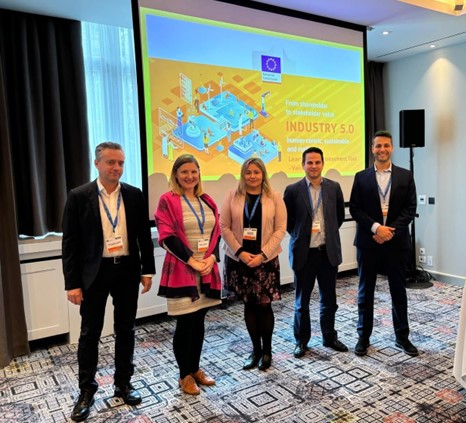
Marc Lemaitre, Director General Of DG Research and Innovation opened the event, stating: “The concept of an Industry 5.0 is a significant shift for European industries, as it brings together technological advancements and human-centered values. In just four years, it has earned a strong reputation and is increasingly visible in policies and initiatives across Europe. Today, we reflect on the achievements of the Community of Practice and discuss the next steps in building a sustainable, human-centric, and resilient EU industry.“
The high level panel comprised Lina Galvez from the European Parliament , Jean Pascal Riss from Schneider Electric Judith from the European Round Table for Industry – ERT Andrea Renda from CEPS (Centre for European Policy Studies) Guido Nelissen of European Economic and Social Committee.
The Industry 5.0 Community of Practice plenary session provides a platform for members to share best practices and explore future directions for achieving Industry 5.0 goals. It brings together policymakers and stakeholders to discuss how the initiative can support the sustainable competitiveness of EU industries.
FORGING in Slovenia: Driving innovation at the 1st SMASHing workshop
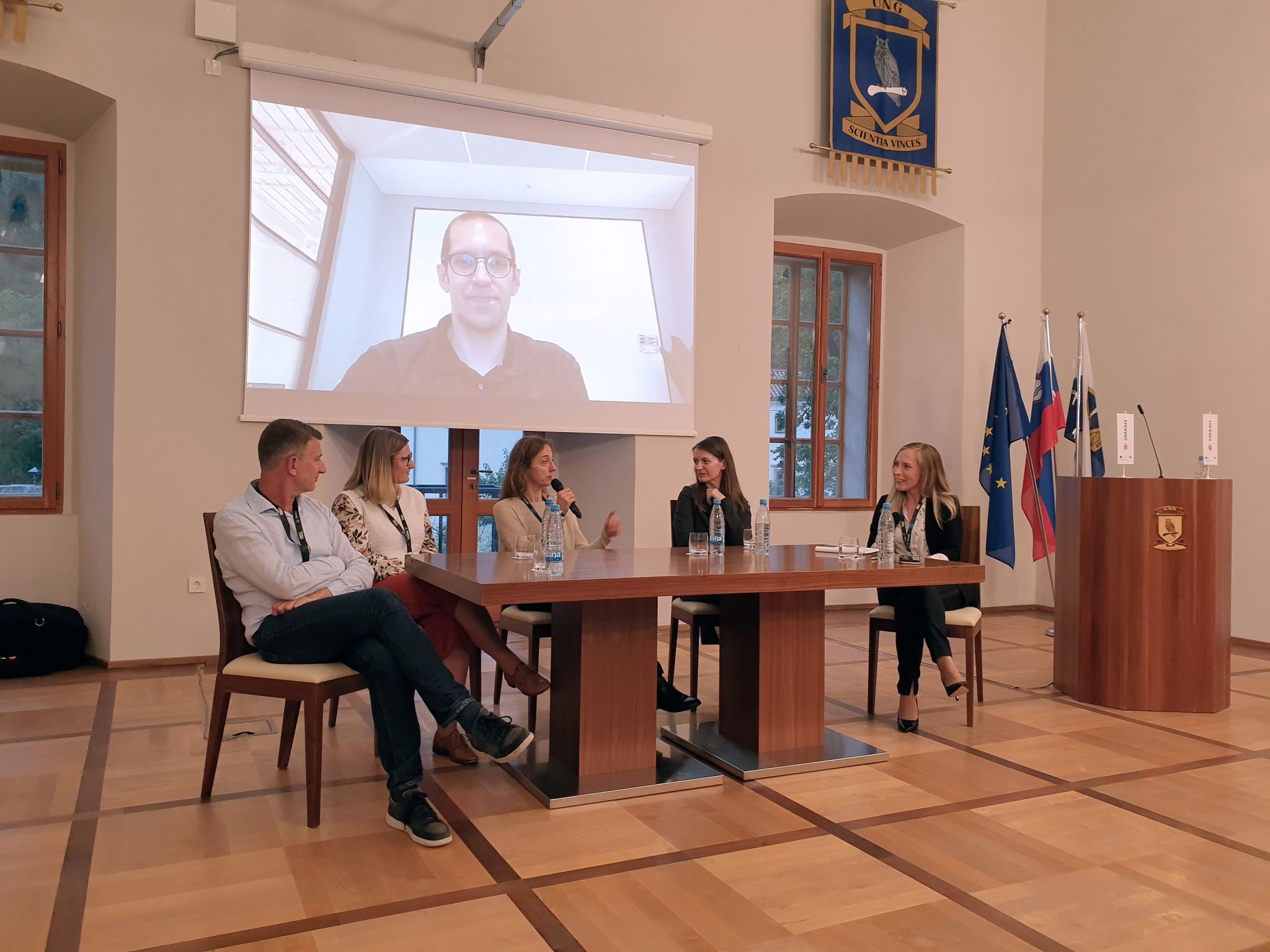
Early October 2024, Brigita Jurisic from INL took FORGING to 1st SMASHing workshop held in Vipava, Slovenia with a lecture on social and environmental value assessment of Artificial Intelligence & Machine Learning technologies.
Emerging enabling technologies such as AI & ML generate new challenges for which we have no established and accepted ethical standards and no metrics for assessing their impact on the environment and society. At early stages of research, the assessment of the potential impacts is challenging as we are often far from the understanding of the use cases of the technologies being developed.
The history is full of examples of new technologies being deployed before we fully comprehend how they will affect our physical and mental well-being and the society in which we live. A call for more collaboration between social sciences, humanities and arts with the STAM researchers was made to enable development of new normative ethical standards. FORGING´s co-creative and multi-disciplinary and multi-sectorial approach was highlighted as a good practice in conducting responsible research. A review of major ethical concerns regarding the use of AI & ML technologies was done to ignite the researchers in thinking of the potential unintended consequences of the systems developed, once deployed and in use.
The workshop brought together 78 international researchers and experts, working on cutting-edge AI and machine learning applications across sciences and the humanities. Participants came from 16 European countries (Slovenia, Germany, Austria, France, UK, Spain, Greece, Croatia, Serbia, Bulgaria, Romania, Ukraine, Netherlands, Switzerland, Estonia, Portugal) as well as the USA, Pakistan, and India. The workshop coincided with the awarding of two Nobel Prizes for the first time in artificial intelligence and machine learning—fields that are at the heart of the SMASH project and were thoroughly explored in our discussions. We also had lecturers from institutions associated with the Nobel laureates, including DeepMind and the University of Washington.
As a part of this innovative, intersectoral, career-development training program was also a public round table discussion on the Impact of AI on Science and Society.
The panel was composed of:
▪️ Vida Groznik, PhD (CEO and co-founder at NEUS diagnostics and Assistant Professor at Un. of Ljubljana, FRI)
▪️ Brigita Jurisic (Business and Strategic Relations Officer, INL, Portugal)
▪️ Uroš Seljak, PhD (Cosmologist, Professor at UC Berkeley)
▪️ Tanja Samardžić, PhD (Linguist, Professor at Un. of Zurich)
▪️ Nenad Tomašev, PhD (Staff Reserach Scientist at DeepMind)
For more information check the programme website.
Stakeholder workshop at the French technopole Sophia Antipolis engages with local innovators
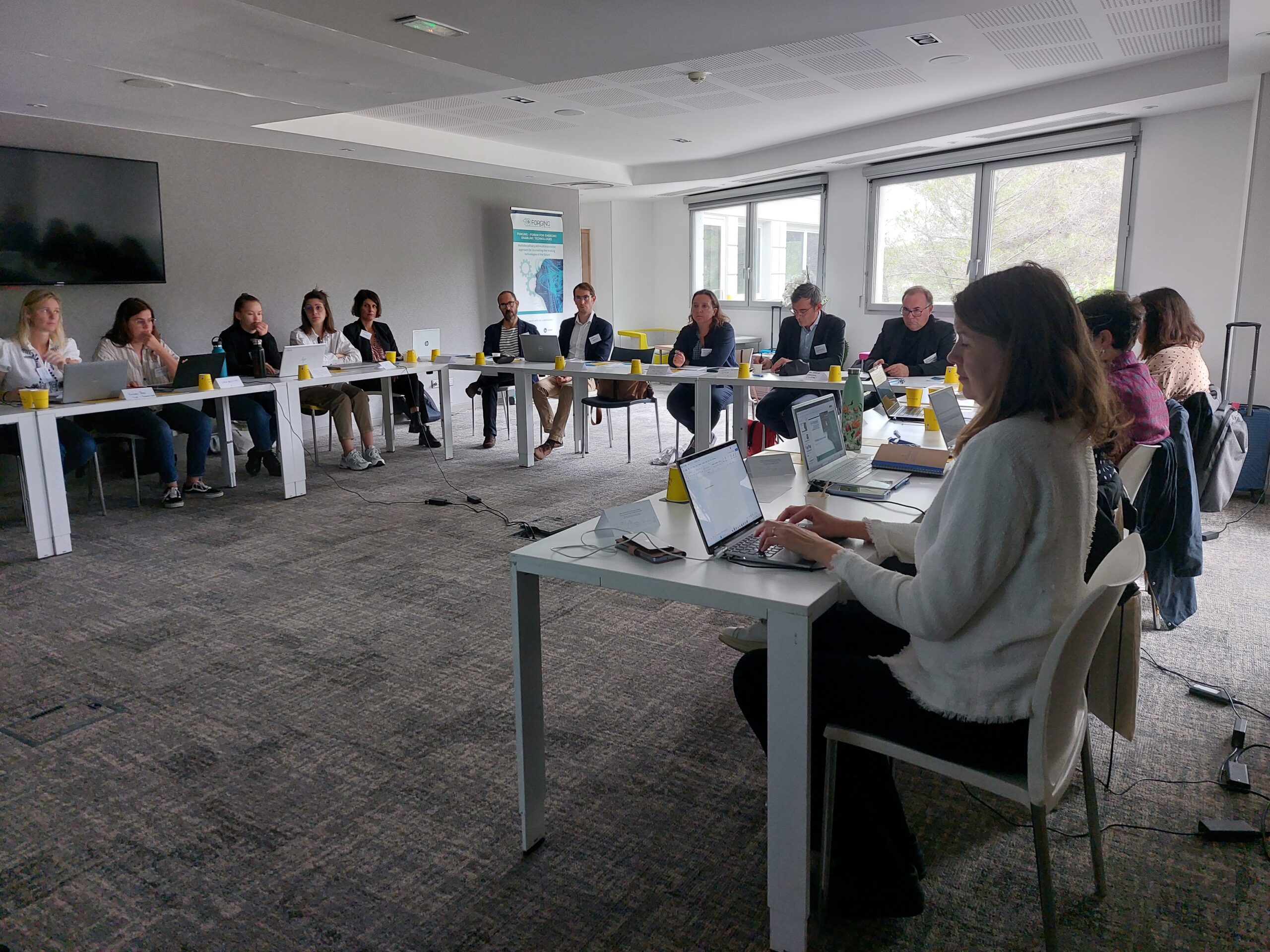
The FORGING consortium gathered in the technopole Sophia Antipolis, France, on 3-4 October, where local stakeholders were invited to participate in a dedicated consultation workshop.
Representatives from the local innovation ecosystem – companies, incubators and clusters – joined the consortium to discover the “Value Sensitive Innovation Journey” and explore the Toolbox prototype.
This interactive session provided an opportunity for stakeholders to gain insights into the project’s key tools and methodologies while testing our tools and offering their valuable feedback.
Open Living Labs Days 2024
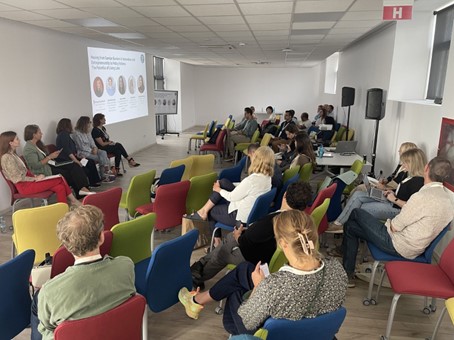 i2CAT Foundation, FORGING partner, attended the 2024 Open Living Labs Day Congress, in Timisoara, Romania, from 25 to 27 September 2024. They participated in two key sessions, emphasizing the need to assess societal and environmental impacts of technologies: “Challenges are common and global: the vital role of living labs in an inclusive and participatory approach in the UN 2.0 (session 1)” and “Driving innovation: the role of living labs in supporting SMEs through test-before invets strategies (session 2)“.
i2CAT Foundation, FORGING partner, attended the 2024 Open Living Labs Day Congress, in Timisoara, Romania, from 25 to 27 September 2024. They participated in two key sessions, emphasizing the need to assess societal and environmental impacts of technologies: “Challenges are common and global: the vital role of living labs in an inclusive and participatory approach in the UN 2.0 (session 1)” and “Driving innovation: the role of living labs in supporting SMEs through test-before invets strategies (session 2)“.
The first session highlighted how Open Living Labs (OLLS) can address global challenges, especially as the UN 2.0 sets a new global agenda. While current innovation ecosystems are limited by regional boundaries, OLLS foster collaboration, inclusivity, and international cooperation. They play a crucial role in achieving the SDGs, focusing on equality, digital inclusion, education, and sustainability, while engaging diverse stakeholders in solving real-world problems. While the second one focused on how Living Labs provide provide SMEs with controlled environments to test products before investment, reducing risks and fostering systemic change. Concrete examples from Catalonia illustrated how synergies between digital innovation hubs, industrial clusters and living labs stimulate innovation, but also the importance of citizen-centered knowledge valorization in ensuring societal acceptance.
i2CAT’s involvement emphasised the real societal impact of technology and the importance of socially responsible innovation.
Rome Future Week 2024
APRE took part in Rome Future Week 2024 on 16 September 2024, the series of events spread across the metropolitan city of Rome, with the aim of promoting innovation, knowledge and creativity. FORGING results were presented in relation to its support of digital and green transitions by ensuring that emerging technologies like 6G incorporate environmental and social considerations into their development. FORGING emphasizes key societal and ecological criteria such as inclusivity, transparency, energy efficiency, and circular design. These themes align with the broader goals of fostering a sustainable and ethically responsible use for 6G networks. Participants were also engaged in an interactive session aimed at exploring social desirability of possible 6G applications.
Read more about this event with the short interview of APRE: HERE.
Event hosted by the Mobile World Congress (MWC) Barcelona
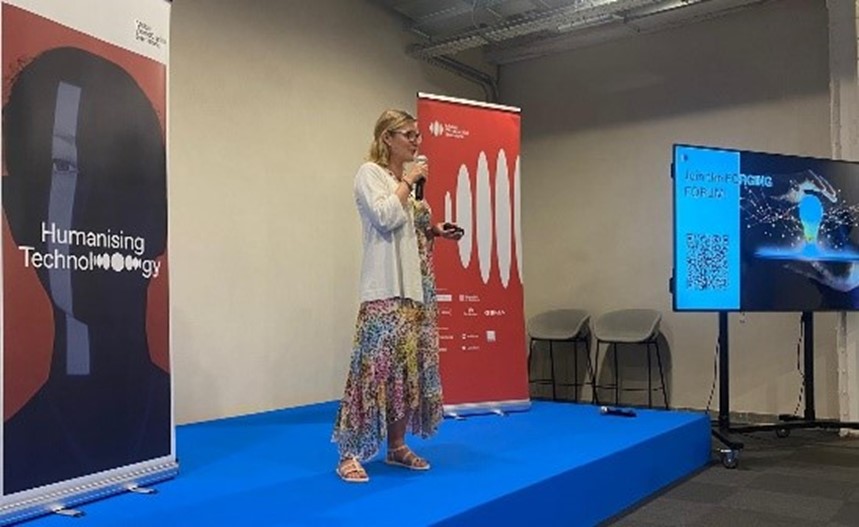
Last July, INL – International Iberian Nanotechnology Laboratory took FORGING to Barcelona together with other EU Projects hosted by MWC Barcelona.
The event’s objective was to exchange best practice on project management, stakeholder management and development of post-project plans including exploitation of project key assets.
Integrating SSH aspects in Horizon Europe projects
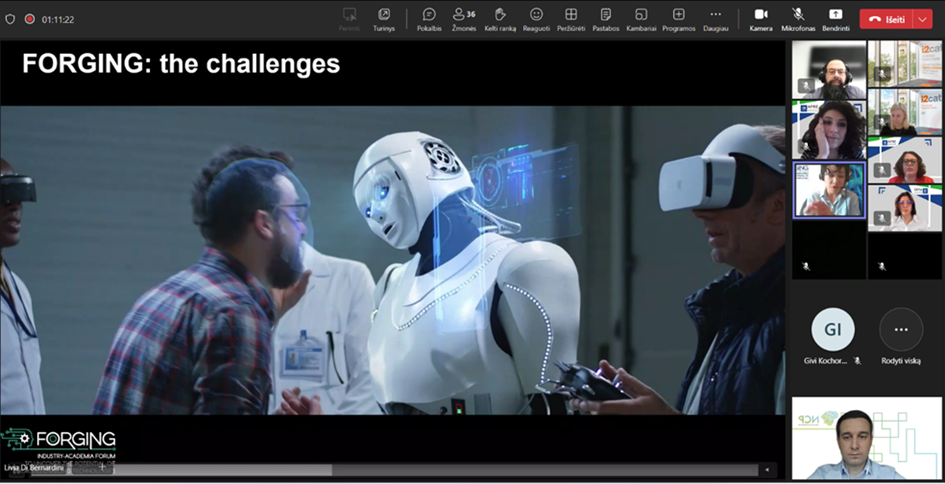
On 15 May 2024, APRE participated in the online event ‘Unlocking the potential of the SSH in the Horizon Europe projects‘ presenting FORGING. The event, organised by NCP4Industry together with Net4Society, was a valuable opportunity to discuss the relevance of integrating Social Sciences and Humanities (SSH) into Horizon Europe Cluster 4 proposals and projects.
During the event, a roundtable addressed key questions about integrating SSH into CL4 projects such as challenges related to differing terminologies and methodologies between SSH and STEM disciplines, with solutions involving facilitating mutual understanding. It has been noted that the Horizon Europe framework can be adjusted to encourage and foster SSH integration by providing guidelines and incentives, increasing funding for interdisciplinary projects, and involving SSH experts in the review process. By addressing societal and environmental implications through collaborative development, FORGING aims to ensure that emerging technologies contribute positively to the digital and green transitions, aligning with broader societal values and priorities.
European researcher’s night 2024

FORGING participated in this year’s activities of the European Researchers’ Night in Braga – Portugal, showcasing our commitment to civic society engagement. The event is an annual celebration dedicated to promoting the importance of research and engaging the public with scientific knowledge. The initiative attracted 1400 enthusiastic visitors in Braga alone, while taking place across 25 European countries and more than 50 cities, highlighting the widespread impact of scientific exploration.
Partnering up with the insightful project FRONTSH1P, our team had the privilege of being featured at the EU Corner, a dedicated section highlighting projects funded by the European Union.
